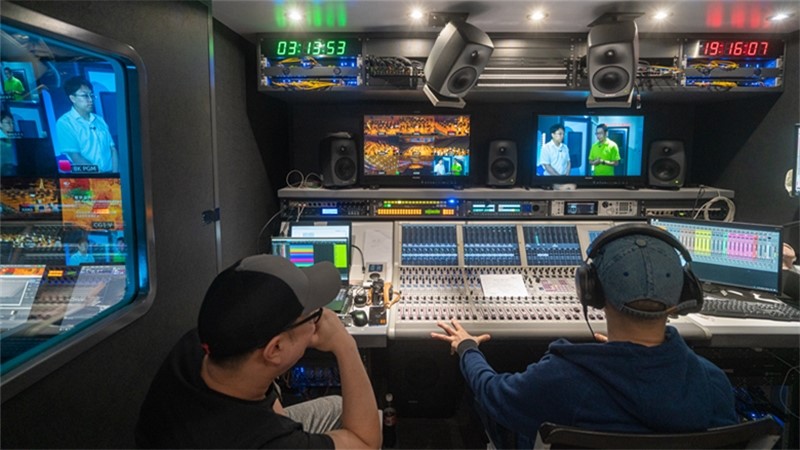

 |
| The National Centre for the Performing Arts (NCPA) uses 8K resolution and 5G technologies to broadcast live a concert for the first time, Aug. 8. (Photo/official website of the NCPA) |
Watching the online performances rolled out by China’s National Centre for the Performing Arts (NCPA) (http://en.chncpa.org/) has become an eagerly awaited cultural activity for Li Jingquan, a citizen in Beijing.
Online performances are usually free or cost less than offline shows, and can be enjoyed by audience whenever and wherever they want, which means a lot to people who cannot attend the performances of the NCPA on site, said Li.
People watching online performances could also have better audio-visual experiences by switching between different types of shots, Li noted, explaining that online performances enable audience to see close-ups of actors and their instruments through the screen, which is difficult to realize in offline shows.
Since April, the NCPA has rolled out a series of online performances in a bid to help audience enjoy high-quality art performances at home and cultivate people's interest in art.
The online performances, which cover such categories as symphony, chorus, chamber music and opera, have been offered for free to audiences both at home and abroad, bringing art to more people through online channels.
Up to now, the NCPA has provided a total of 34 online performances of three series. As of Nov. 5, its online performances had been played for 1.027 billion times accumulatively, with each show gaining 30 million views on average.
"The online performances rolled out by the NCPA have gradually made music an indispensable part of my life," said a netizen.
A German netizen commented that relaxing with wonderful music released by the NCPA and returning to inner peace is one of his ways to relieve pressure after a long day of stressful work.
Providing online performances for audiences doesn't simply mean putting performances online. Efforts must be made to adapt art performances to their new media and contents, and popularize refined art among ordinary people.
To help audience better appreciate online performances, the NCPA has made certain adjustments to performances.
It has invited well-known artists to popularize art knowledge among audience through introductions, interviews, conversations and other forms before the opening of online performances so as to help ordinary people understand the performances from both onstage and offstage perspectives, according to Gong Jicheng, deputy head of the NCPA.
The NCPA has also enriched the variety of its online performances to meet the diverse needs of audiences. At first there were only small-scale concerts on the website of the NCPA, and then many more forms of art performances have been gradually brought online, such as larger concert, dance, drama as well as traditional Chinese opera, Gong added.
Online performances also mean new requirements for relevant technologies.
At the beginning of August, the NCPA established 5G network and used 8K resolution and 5G technologies to broadcast live a concert for the first time, realizing a new attempt in combining art and technology.
During the concert, audience could watch live ultra-high-definition performances via display terminals installed in eight places in Beijing.
Combining art and technology, the feast to both eyes and ears has enabled music to travel across the city.
Online performances could also attract more people to offline shows. A survey conducted by the NCPA suggests that 74 percent of the audience who have watched online performances said they want to come to the NCPA for more offline performances.
It should be noted that although online performances can never actually replace offline ones, they have quietly changed the ecology of art performances.
Industry insiders pointed out that online performances are marching toward a development path that helps break the one-way output model and establish an interactive art ecology.
For the next step, efforts should be made to innovate the forms of art performances, while showing more production processes of performances to audience, so that more people can learn about the stories behind the scenes.
 |

 Award-winning photos show poverty reduction achievements in NE China's Jilin province
Award-winning photos show poverty reduction achievements in NE China's Jilin province People dance to greet advent of New Year in Ameiqituo Town, Guizhou
People dance to greet advent of New Year in Ameiqituo Town, Guizhou Fire brigade in Shanghai holds group wedding
Fire brigade in Shanghai holds group wedding Tourists enjoy ice sculptures in Datan Town, north China
Tourists enjoy ice sculptures in Datan Town, north China Sunset scenery of Dayan Pagoda in Xi'an
Sunset scenery of Dayan Pagoda in Xi'an Tourists have fun at scenic spot in Nanlong Town, NW China
Tourists have fun at scenic spot in Nanlong Town, NW China Harbin attracts tourists by making best use of ice in winter
Harbin attracts tourists by making best use of ice in winter In pics: FIS Alpine Ski Women's World Cup Slalom
In pics: FIS Alpine Ski Women's World Cup Slalom Black-necked cranes rest at reservoir in Lhunzhub County, Lhasa
Black-necked cranes rest at reservoir in Lhunzhub County, Lhasa China's FAST telescope will be available to foreign scientists in April
China's FAST telescope will be available to foreign scientists in April